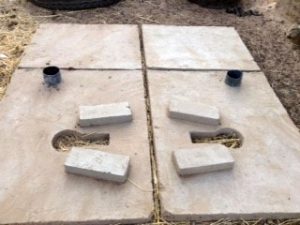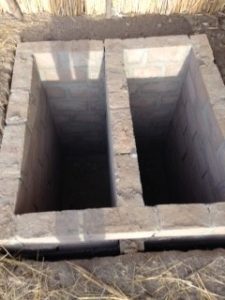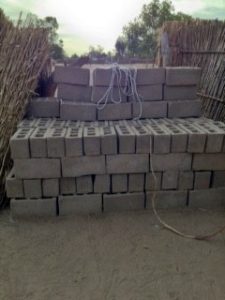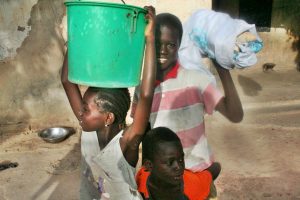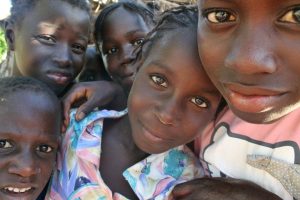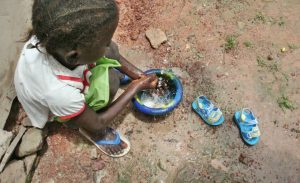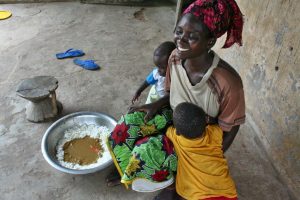This project is made possible through the partnership of WATER CHARITY and the NATIONAL PEACE CORPS ASSOCIATION. ![]()
This project has been completed. To read about the conclusion, CLICK HERE.
Location
Koumbidia Soce, Commune Saly Escale, Region, Kaffrine, Senegal
Community Description
Koumbidia Soce is a small Mandinka community South West of Koungheul. All water for household needs is drawn from local wells by the women.
Problem Addressed
The community lacks sanitary facilities, and open defecation is prevalent.
A little over 1/3 of the community has or had a latrine. However, there are only 2 fully-functional latrines, and most latrines are either full, shared, or in extreme disrepair.
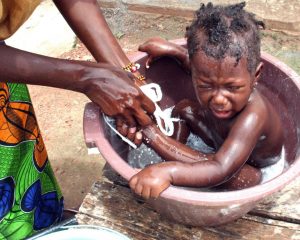 Project Description
Project Description
This project is to build 39 latrines and 40 handwashing stations. This will result in a latrine and handwashing station for every household.
Each latrine will be cement lined and constructed of cement bricks. It will feature a small latrine cover fashioned of cement or other available materials to deter excess influent from the rain and disease-spreading vectors.
Each latrine will be a 2m x 2m x 2m recessed ground latrine with direct plumbing. It will be surrounded by a privacy fence, built with resourced materials (usually millet stalk, “sacket”). Sacket is available locally and is already located at many of the ancillary failed latrine sites.
Each handwashing station will be located directly adjacent to the latrine, with water made available from a kettle, and soap attached to the privacy fence. There will be a small pit filled with gravel and stones to ensure hygienic draining.
Water kettle filling is a responsibility taken on by all family members. The handwashing station will be in a relatively public view and should encourage handwashing behavior practices. The additional handwashing station is to be built at the school, where there exists a latrine but no handwashing station or current latrine sanitation program.
Under the first phase of the project, a baseline survey to assess latrine needs was completed. The second phase will consist of community mobilization and sensitization by mandatory sanitation practices and causerie attendance. There is a signed contract with each household delineating these stipulations. The third phase will be the construction of the latrines.
Health workers from the community will attend a Training of Trainers (TOT) workshop on basic WASH techniques based on Peace Corps WASH programming. After the training, women health workers should be able to host their own WASH behavior change sessions in their community on topics such as handwashing techniques, care of the latrines, construction of handwashing stations, and proper WASH behaviors.
In order to have a latrine constructed, the head of the household must complete the latrine voucher. The mother and the head of the household are required to attend the WASH formations and the head of the household is required to attend all planning and committee meetings.
Each family will be responsible for digging the hole, bringing sand and gravel from the fields, helping to transport materials, paying the mason, and participating in the maintenance of the latrine at the school. Also, a handwashing station must be constructed in every household.
Water Charity funds will be used to purchase the materials and pay for the labor of the skilled masons.
Project Impact
The entire community of over 700 men, women, and children will benefit from the project.
Peace Corps Volunteer Directing Project
Erica Peery
Monitoring and Maintenance
Families will be well trained to properly use and care for their own latrines. They will also clean and maintain the school latrine on a rotating basis.
Comments
The project design provides for low-cost reinforced cement-lined latrines, with maximum community participation, and eliminates the practice of open defecation.
The project will result in improved health through the adoption of hygienic practices in daily living.
Project Funding
This project has been funded by an anonymous donor.
Further donations using the button below will be allocated to other projects in Senegal.
Conclusion of Koumbidia Soce Latrine Project – Senegal
This project has been completed under the direction of Peace Corps Volunteer Erica Peery.
To read about the beginning of the project, CLICK HERE.
Erica reports:
This project aimed to build 39 latrines and 40 handwashing stations in the community of Koumbidia Soce. This project was community driven, and they generated great support in facilitating towards completion of this project.
The community aggregated their resources to come together and dig latrine pits in 30 of 39 all households and counting, as well as transporting all building materials to Koumbidia Soce. All participating households attended sanitation and hygiene trainings, and learned to build handwashing stations. Households were visited to monitor the pit digging and assess their handwashing station. Upon visitation, the vast majority of households had built handwashing stations and were using them correctly!
This project ran into difficulty as the Senegalese government began a dam building project simultaneous to the latrine timeline phase. This dam building project provided competitive paid labor to all masons and many men within the village. While the young boys were able to dig the latrine pits, only 6 households were able to schedule and pay a mason to build their latrine. Masons outside of Koumbidia were unwilling to participate as the labor wage was reduced as part of the community contribution of the village.
In order to preserve the sustainability of this project, the community in Koumbidia came together and voted on a new plan of action. They aggregated the unused materials of households that had pits and transported the little remaining materials to a locked storage area within the village. In order to keep the motivation high for households, they agreed to store the materials and provide the brick maker’s payment until the family had paid the mason to build the latrine.
Several, but not all of the latrines were completed by the time Erica completed her Peace Corps service. The project was completed by the community under the direction of the sanitation committee, with the Peace Corps following up periodically.
We are grateful to Erica for completing this project.
